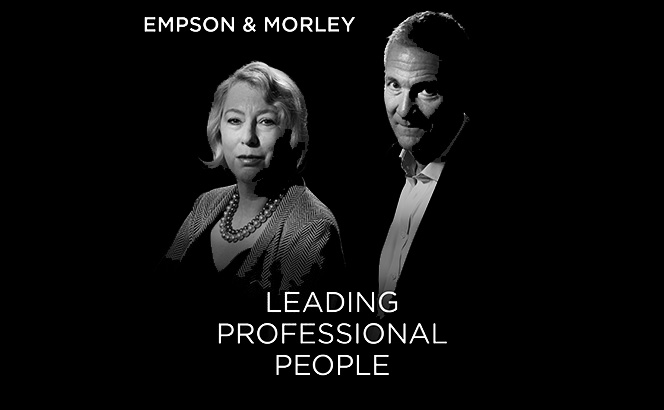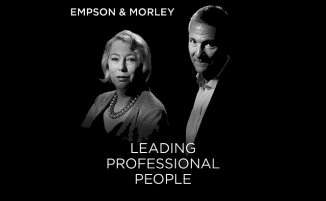Leading a professional firm with offices spread across multiple countries always creates a tension between global and local priorities. Professor Laura Empson and David Morley argue that what feels like a leadership challenge, is actually a deeper and very human struggle.
In our podcast –Leading Professional People – and in these blogs, we find ourselves frequently grappling with a timeless and very human paradox that sits right at the centre of what it means to lead a professional firm.
It’s a paradox that lies within the human psyche.
On the one hand we have an urge to establish ourselves as distinct and autonomous individuals.
It’s what psychologists such as Carl Jung call ‘individuation’ – the process of establishing our individual identity that starts in babyhood as we begin to understand ourselves and separate from our mothers.
Yet at the same time, there is an equally powerful human instinct to seek validation, to feel part of something bigger than ourselves by identifying with a social group with shared interests and concerns.
This may all sound a bit off the point, but this individuation/validation paradox is something that leaders of professional partnerships wrestle with on a daily basis in trying to create a cohesive organisation within which highly autonomous professionals can feel at home, valued and energised.
For leaders of global professional firms, with a network of offices spread across many countries, the paradox applies on a massive scale as they try to reconcile the needs of the global with the demands of the local.
So this isn’t just a leadership challenge. It’s actually a perpetual struggle that goes to the heart of what it means to be human, which explains why it can be frustratingly difficult to get right.
Leaders use different approaches to tackle the inherent tension between head and local office, a tension, which, of course, grows more complex as the organisation grows larger.
But typically, what holds an organisation together are governance structures, systems for managing performance, and the cultural norms that bind autonomous individuals into a collective whole.
Within that there may be other powerful binding agents.
For some firms it could be around a collective commitment to quality – for instance a determination to refer work to colleagues within the firm, confident that they will provide clients with the same high level of service. When quality slips in one area of the business, or one office, there will be a clamour from partners everywhere else for the leader to put that failure right.
But when a partnership grows too quickly or too large, this level of highly effective peer pressure will become diluted. Recent criticism of McKinsey has suggested this may have been part of the problem.
Which is why it was so interesting to talk to Philip Davidson, global chief operating officer of KPMG (equivalent to managing partner in the KPMG structure), in our latest podcast to find out what approach is taken in a giant professional firm comprising a federated network of 150 member firms around the globe, nearly 12,000 partners and more than 200,000 employees.
These are very big organisations. Remember that rival Big Four firm PwC is actually present in 50% more countries than McDonalds. Of course, the Big Four firms dwarf even the largest law firms and are very different businesses. But perhaps they offer some clues as to how to tackle issues that affect all firms once they grow above a certain size.
Philip explains that his role is to ensure the firm’s collective strategy is put into action by all 150 member firms, helping, encouraging and corralling them to execute the strategy.
The strategy is expressed in a simple set of words: ‘To become the most trusted and trustworthy professional services firm and take market share from our competitors.’ And it is backed by what he calls two pillars – ‘consistency and accountability’.
That provides the firm with a clear organising principle. But in a firm so large – one that is effectively ‘a partnership of partnerships’ – executing that strategy calls for additional levers and systems.
And, whether you are a global law firm or a Big Four accounting firm, it is a balancing job. You need to create consistency at a global level while respecting local difference and encouraging entrepreneurialism, because, after all, the local offices are closest to clients and are the places where growth actually happens. But they can also pose a reputational risk to the global firm as a whole if things go wrong.
Achieving quality has to be done both at the global and local level. Investment in technology too needs to happen collectively, so huge are the costs of acquiring the right systems to carry out a complex global audit or the transformation of a major plc.
To enforce consistent quality globally, KPMG has established a system of steering groups, below the main global board, covering each of the firm’s practice areas. They have the responsibility for managing the necessary trade-offs throughout the network, constantly seeking to reconcile the global/local tension for a range of key decisions.
These steering groups comprise practice leaders from the eight biggest offices in the network and the three regions and are the main mechanism for cascading strategic objectives down to the member firms. If tensions cannot be resolved at this level, then they are escalated back up to the global board, led by the chairman and the senior partners of the 24 largest firms.
Overall, Philip Davidson sees two big benefits of this way of balancing the global and the local. The local partnerships are on hand to help each other out if any other part of the federation is struggling. Meanwhile, the distributed system of leadership also makes the firm more agile and encourages a more rapid cascade of innovation.
This approach represents a big change in governance procedures for the firm. They were introduced at a time of vulnerability three years ago, when KPMG found its South African firm embroiled in a crisis and facing other governance challenges affecting the wider industry.
It’s a good reminder that a crisis often provides an opportunity to make much needed changes that would otherwise not have been acceptable within a partnership.
Philip mentions one other important element in the governance and strategic architecture – direct feedback from partners.
‘I have sounding boards whether I want them or not,’ he told us. ‘I’ve been with KPMG for 34 years and have a strong network of people working with clients every day. They will quickly tell me if they think we are going in the wrong direction.’
It may sound counter-intuitive, but engendering a feedback-rich environment is clearly a critical aspect in achieving cohesion globally. Push back and challenge from partners is a sign of a healthy partnership/leadership dynamic and is not something to be crushed or silenced.
For a professional firm working in many countries it is particularly important.
Within the framework of governance, performance management systems and culture, it provides a vital sense check and a way to ensure that the global and the local are being held in an effective balance.
No leader should be in any doubt, however, of just how tricky that task can be – or how rewarding it is when you get it right.
Click here to listen to their latest podcast, ‘Empson & Morley – Leading Professional People’, where Professor Laura Empson and David Morley discuss the global local conundrum with Philip Davidson.












